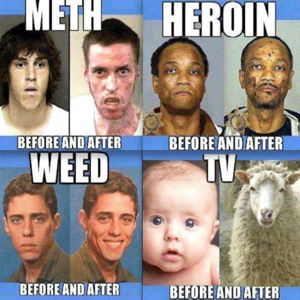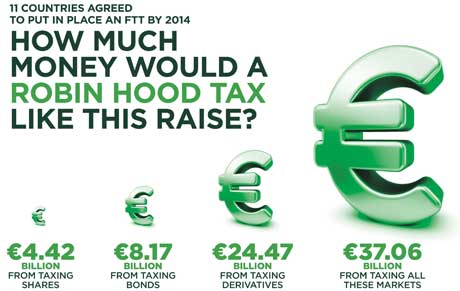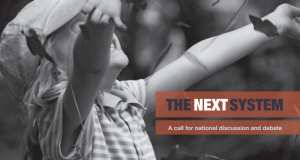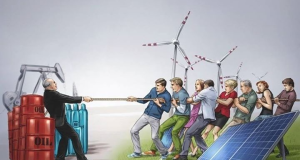It’s easy to become overwhelmed with all the issues in the world today. Below I outline 10 simple changes for a better world, aimed at making sweeping changes to our health and safety while only affecting a handful of for-profit corporations.
10 Simple Changes for a Better World
1. Ban Artificial Food Colouring

If artificial food colouring was banned. (Photo: http://www.disclosurenewsonline.com)
Ah Fruit Loops. What would they be without artificial colouring… cheerios?? Did you know M&Ms don’t have artificial colours in Europe, but they do in North America? Why?
Like all healthy things, artificial colouring is made from Coal tar and petrochemicals, and thanks to the revolving door between corporate executives and government regulatory agencies, this shit is everywhere, and it’s not good for you.
Next time you’re walking down the isle of any grocery store, imagine what it would look like if we finally banned artificial colouring. The outside circuit of the store (why are the fruits, veggies and dairy always against the wall??) would be affected the least, though fruit and veggies still get their dose. The inside aisles, where they line up all the processed food, would be practically empty.
I can’t find a list of the companies that actually make artificial colouring, which in itself is worrying, however, we know these petroleum companies choose profit over your health and safety, so fuck ’em.
Why not use natural colours? Increased costs… profit. There is no other reason.
2. Ban Artificial Food Flavours

Without artificial colours and flavours, would you eat any of this?
While we’re at it, let’s ban artificial flavours as well. These two laws alone would shrink the processed food market substantially. Obesity, fast food, candy bars and fizzy pop, all gone. Don’t worry, Blue Sky and other “natural” guilty pleasures would stick around and see a boom in business.
Naturally, (pardon the pun) these two laws would need to be global, but we’ll start in the U.S.A., by far the largest users of artificial products thanks to the ineffectual FDA.
Givaudan, who control almost 25% of the global “flavour and fragrance” market with over US$4.7billion in sales in 2014, claims to “create tastes and scents that delight consumers, stir memories and touch people’s emotions.” How very exciting.
These 2 laws would only affect a handful of wealthy profit-focused corporations, and we would stop being sold cancer causing food. Sounds fair to me.
3. Ban “fancy” shaped bottles

So many shapes, so many problems. (Photo: http://www.sha.org)
We all love recycling and re-using, right? Imagine if we passed a law that allowed for one standard shape of plastic and glass bottles, available in only small, medium and large.
Bottles could still be glass or plastic, but no more “fancy” shapes or sizes. Just a handful of globally standard shapes and sizes.
Vanity shapes and sizes are just that. The only reason for the thousands of shapes and sizes is marketing. Do you really get nostalgic at the shape of a bottle of coke? Of course not – that’s just the marketing people talking. Let them keep their pretty, colourful labels, but enough is enough with the unlimited shapes and sizes.

Ironically we turn scare oil in to plentiful bottles. (photo: becausewater.org)
Shipping costs would be reduced, recycling and re-using would become infinitely easier and more affordable, and the products would still taste the same.
Who would be affected by this? Marketing companies (which suits me, they are among the scourge of the earth, so fuck ’em), the bottle manufacturing companies and… um… actually, I guess that’s it.
Who would benefit? Oh, the planet, for one. American’s use 17 million barrels of crude oil annually in water bottles alone, and throw away 35 billion bottles each year). Now, I’m not against plastic – it’s one of the most versatile and amazing products we’ve ever created… we just need less of it.
IF we passed a law like this, you’d better believe that an increased awareness of garbage and recycling would come along with it.
By the way, did you know that most water bottles are made using the water you later drink? They spray the water against a heated “coin” of plastic allowing the pressure of the water to fill a negative bottle mold. The “drinking water” creates the bottle, cools the molten plastic, and is now ready for your consumption. Yummy.
4. Replace all power generation with global solar
Sure, this is a big one, but it’s on here to make a point. According to recent calculations, to power the entire world with solar using existing solar technology, we would only need to cover 65,000 square kilometers of the earth with solar cells. Sounds like a lot? The Sahara Desert is 9,400,000 sq. km! We’d need less than 1% of it. Sand, the main component of deserts and silicon (silicon being the main component of solar cells) would be readily available, locally.
I know what you’re thinking – the Sahara Desert is miles away! OK, lets spread the 65,000km² of cells around all the deserts of the world.
OK, I know what you’re really thinking – that would require co-operation between all the global super powers, a decentralization of the national power grids, and a global approach to climate change.
Right.
Here we see the real reason Solar has fought for so many decades to take off. National energy companies don’t like to share – if they did, Tesla might have found some market share 100 years ago. Until we look past nation-borders and see our planet as one we will never fight climate change. What are we waiting for?
With Social Enterprises running the power plants, plugging the power in to the existing global grid, and ensuring the plants are evenly space around the world to ensure 24/7 access to sunlight, our energy ‘crisis’ would be over. We’d create a ton of jobs at the same time – politicians love jobs.
5. Ban Private For-Profit News Corporations
If all News corporations were non-profit Social Enterprises, that is, we remove the motivation to make “News” a profit-center, we would instantly remove the financial incentive of attracting viewers. News shouldn’t be treated like television shows or magazines – profit should not be the motivator for running a News corporation or for deciding which news is “worthwhile”.

Can for-profit news ever be unbiased?
Two of the world’s largest news syndicates, Reuters and the Associated Press, deserve special mention.
Reuters is mostly owned by Canada’s Thompson family. As of October 2012, Thomson is listed as one of the wealthiest people in the world with an estimated net worth of $22.2 billion. The remainder is publicly traded and owned mostly by Canadian banks and financial organizations, all of whom place profit as their first priority. There are rumours the Thompson family have connections to the Rothschilds, but that’s for others to discuss. Reviewing the list of acquisitions made by Reuters, it’s reach imitates that of the Koch Brothers’ Kochtopus.
The Associated Press is a non-profit corporation, but because it’s owned exclusivity by for-profit corporations, the non-profit aspect is really just a shell game, not a philosophy.
Until we can remove the profit-focus from the News, we will never have a truly balanced, unbiased understanding of our world’s real current events.
6. Reduce Patents and Copyright terms to 2 years
As discussed elsewhere on this site, patents and copyrights make up the Intellectual Property that businesses use to maintain their competitive advantage.
In Canada, copyrights are held for the live of the author plus 50 years. Patents are now held for 20 years.

In 2011, patent trolls cost U.S. companies more than $29 billion in legal fees and settlement costs.
Now, if you invent something magical and wonderful, of course your invention should be protected for a few years to allow you to benefit from your invention. The problem is, copyrights and patents can be transferred to other people and corporations.
If I invent a new energy-efficient battery, I can use patents to protect my design from theft and enjoy the profits of my invention. However, lets say, oh, I don’t know, an Oil Company buys my patent, they can now shelve the technology and prevent it from reaching the market for the remainder of the 20 years, plus any extensions their fancy lawyers can obtain.
There are thousands of examples of globally transformative technologies which have been bought up, shelved and hidden from public use thanks to the use of patents, trademarks and copyrights. Google it.
If the terms were reduced to 2 years, far more inline with today’s faster, global innovation and adoption curves, corporations would no longer be able to continue flogging their old, shitty technologies by shelving and hiding the innovative game changing ones.
Of course, if the inventors didn’t sell their patents in the first place…… but that’s another story.
7. Create a 0.5% Transaction Tax on all Stock Market Trades
The Robin Hood Tax is pushing for this, and it’s awesome.
Basically, what we’re after is a tax that raises hundreds of billions of dollars annually from the financial sector, to reset our economy, stop austerity policies that are cutting public services, and help in the global fight against poverty, AIDS and other diseases, and climate change.
We think the best way to do this is a Financial Speculation (or Transaction) Tax (FST/FTT). This is a tiny tax of less than half a percent on trades in derivatives, stocks, bonds, and foreign currency exchange. With an FTT, each time a financial product is traded, a tiny percentage (between 0.005% and 0.5%) of the value of the trade is collected in tax.
— http://www.robinhoodtax.org
Not only would this curb the dangerous high-volume trading which is argued to have destroyed the integrity of the Stock Market, it is estimated that this tiny tax, paid only by those rich enough to gamble in the markets, could generate tens of billions of dollars in Canada alone!
8. Ban “Shorting” of Stocks

As stocks crashed, profits grew.
While we’re talking about the stock market, for you non-traders, “shorting” a stock is basically the ability to profit off a stock that drops in value.
Take a moment and think about that.
You can profit off a business that under performs, fails, or declares bankruptcy. If you own enough stocks to sway the market, which is easier than you think if you also own the media corporations, you can earn money by destroying people’s livelihoods.
Take another moment and think about that.
Who, other than rich people that enjoy destroying companies for profit, think this is a good idea?? Shorting stocks creates a financial incentive for investors to encourage companies to fail. Brilliant.
9. Quit the Military
 Do you know what happens if no one joins the military in 2015? Peace. Today’s global militaries are made up of primarily under-educated young kids (thanks to the decrease in education funding in every militarized country in the world) who are then often promised free education if they survive.
Do you know what happens if no one joins the military in 2015? Peace. Today’s global militaries are made up of primarily under-educated young kids (thanks to the decrease in education funding in every militarized country in the world) who are then often promised free education if they survive.
As long as people sign-up for military action we will have troops pulling triggers, returning with shell shock (sorry George, “Post-Traumatic Stress Disorder”) and being hired by equally unstable private military contractors or the newly militarized Police squads.
There are easier ways to get better education – especially if Thomas Mulcair and Bernie Sanders win the next elections.
10. Turn off the Damn Television
I hope this requires no explanation, but here it is:
Television wasn’t invented to entertain you, it was invented to sell advertising. Period. Commercials, by their very nature, sell you shit you don’t need. They use advanced psychology to make you believe that you are a useless, ugly, looser who needs their products if you want to “Fit in”.
 Television time is not “free time”!
Television time is not “free time”!
Private for-profit media corporations are interested only in selling advertising and will fill the airwaves with anything that will distract you long enough to watch their commercials. Add in product placement and it’s a recipe for mindless consumerism.
Download your (commercial-free) tv shows, sign up for Netflix, or go for a walk – you’ll be amazed at how much stress will disappear from your life. Suddenly you’ll buy less crap and waste less time – just the ingredients needed for that trip of a lifetime you’ve always imagined.
Conclusion
One day, perhaps, I’ll be King of the World and these 10 simple changes for a better world can take effect. In the meantime, please think of these 10 ideas during your day. We don’t need laws to tell us how to make the world better, we just need to make better choices.
Are these changes simple?
I argue they are – not from a logistic standpoint, but because all of these changes could be put in place tomorrow if the appropriate stakeholders were motivated enough. Who are the stakeholders? We are – you and me.
If you’re in the “middle class”, you are the only person who can affect change. You are the consumer class. Until we evolve to Capitalism 2.0, as long as profit is the primary motivator for everything we do, your wallet and your vote will determine every single policy change and innovation our world takes on. The poor have no choices, and the rich have no motivation for change.
These changes are simple because when the consumer class recognizes that we are our own victims and unite together under a banner of Peace and Change….. everything becomes simple.
 Promoting World Peace ⊣ "Capitalism 2.0" | I’m No Expert Isn't it time we all got along? Promoting World Peace, Capitalism 2.0, Social Enterprise, co-operation, optimism, forgiveness and an eye to our collective future
Promoting World Peace ⊣ "Capitalism 2.0" | I’m No Expert Isn't it time we all got along? Promoting World Peace, Capitalism 2.0, Social Enterprise, co-operation, optimism, forgiveness and an eye to our collective future






One comment
Pingback: Investing In a Better World – The GoodNews Media